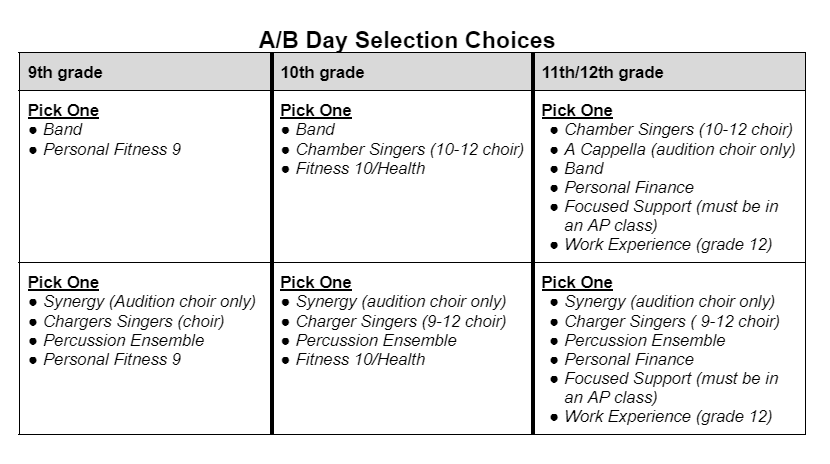Devaluing Music: Hamilton Administration Out of Tune with Student/Parent Concerns
Photo from Pexels by Pixabay.
Aanya Ranasaria & Nika Stacey
On Wednesday, January 17, HHS families received a letter regarding schedule changes for the 2024-25 academic year, specifically changes in the band and choir class schedule. This current year, and for the past several years, music classes have been run on a split-block schedule. This means students take a class year-round 3.1, have B lunch, and have band/choir 3.3. This allows students to take several different classes, including core classes, opposite music. While they vary year to year, these classes are commonly Communication Arts and Social Studies classes. Students also have the option to take a Focused Support, provided they are in an Advanced Placement class.
In the upcoming year, Hamilton is transitioning to an A/B block schedule for music students. This means that instead of following a daily schedule, students will alternate between different classes on an A and B day basis. For example, a student could take Band on A days and Focused Support on B days. The new music scheduling change at Hamilton High School has sparked concerns among music students and parents despite its stated goal of "enhancing the overall academic experience" and "maintaining a year-long music experience." While this schedule has the potential for some advantages to students and teachers, there are many flaws with this schedule change.
Shriya Venkataramani, a junior in band, states, "I don't really like the idea of music classes only taking place on alternate days next year. In fact, it feels like it is limiting me further to take the classes I want to take and the general organization of my schedule." This is a concern many music students share, as the lack of course options available to students during the periods opposite their music classes is detrimental. For freshmen and sophomores in band, choices are restricted to Synergy, Chargers Singers, Percussion Ensemble, and Personal Fitness. Upperclassmen in band have an only slightly broader selection, with Synergy, Charger Singers, Percussion Ensemble, Personal Finance, Focused Support (requiring multiple AP enrollments), and Work Experience (grade 12 only). Focused support is typically meant for students with multiple AP courses, however, an exception is made in order for band/choir kids to fill their schedules opposite of their respective music classes. The lack of alternatives pose problems for students seeking academic challenges or wishing to avoid taking two music classes simultaneously. Those who have already completed Personal Finance find themselves with virtually no options beyond Focused Support and Work Experience. However, the Focused Support prerequisite of multiple AP enrollments disqualifies most underclassmen, while Work Experience remains exclusive to seniors. Ultimately, many students feel forced to choose between enriching academic opportunities and pursuing their musical passions.
The scheduling change has also raised logistical concerns, particularly among upperclassmen wondering how to fill the musical-adjacent period if they have already taken the supplied courses. A common example involves sophomores who took summer health to create flexibility, only to lack viable class options opposite band or choir. Similarly, juniors who took Personal Finance as underclassmen face a lack of courses beyond the previously mentioned Focused Support or an additional music elective.
Another large issue with this change is the lack of advance notice. Students were notified of this change during finals week, at the end of January, less than two weeks before scheduling for the 2024-25 school year opened, and less than four weeks before scheduling was due. Mrs. Wenzel, a band parent and teacher of 26 years, mentioned how frustrated parents are with the lack of notice, stating, “There was zero communication with parents of band and music students until the letter from Becky Newcomer was sent via email on January 17. The students were not asked to be part of the conversation either. My son and his peers in the band program were frustrated, angry, and confused by the decision.”
When asked their initial opinions on the schedule change, junior Elena Wright commented, "I'm upset about it. Administration dropped it on us with no warning, and from what I understand, the music teachers had little say in the decision." This caused many students to panic with a short period of time to reconfigure their schedules and plans. With this change, many students have been forced to consider quitting their respective music classes. For high school students, two weeks is not enough time to weigh the pros and cons of doing something you love or taking advanced classes. This was also not ample time to propose alternative options to administration, weigh feedback and talk about issues with the new system. This change affects students deeply, and it is upsetting to see changes being implemented without consulting the music programs in advance to receive feedback on the potential impact of these decisions.
This approach seems counterproductive to the growth and well-being of our student body. Academic achievement should not come at the expense of students' interests, passions, and personal development. “These choices do not provide any core courses to better serve the academic needs for students. It pigeon-holes the band and choir students to potentially make a difficult decision to choose between staying in the music program or taking courses that best fit their academic goals,” Mrs. Wenzel noted.
With the implementation of the new schedule, our music programs are at an increased risk of lowered enrollment in an already decreasing program. Junior Lilly Peterson states, "[The change] does worry me because the choirs have been getting smaller and this might discourage potential members."
While the intent behind the changes aimed to "contribute to a more cohesive and effective learning environment," many students and parents feel the outcome actually undermines our educational quality. Lots of students agree the A/B day schedule could potentially benefit pupils, but the distinct lack of class options has negatively impacted countless music students. Mrs. Wenzel, who is involved with curriculum changes and standard implementation at the local and state level, states, “If the goal is to address academic needs in the core content areas, I am not sure how this goal will be met given the parameters.” With the lack of clear communication and limited options, numerous students feel forced to drop the music classes they're passionate about.
It is disheartening to see our administration create barriers that force students to make such difficult choices, rather than fostering an environment that supports a healthy balance between academics and creative outlets like music. We understand the importance of academic rigor, but we must also recognize the value of creating well-rounded individuals who can thrive in various aspects of their lives. We urge administration to revisit policies and practices that unnecessarily force students to choose between scholarly success and personal fulfillment.
To music students, this change feels like yet another blow from a system that seems to constantly devalue the contributions and importance of the arts. How can our administration say they hope to "achieve the goal of growth and success of our students in their academic careers" when they are making students choose between academic development and doing something they love?








